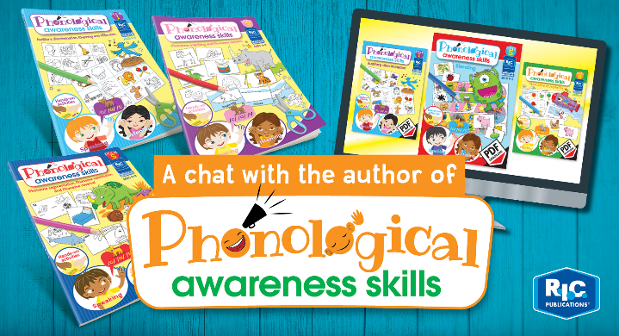- Monday 05 November 2018
- 0 Comments
With our new Phonological awareness skills series hot off the press, we sat down with R.I.C. author Noeline Pullen to discern why this product is needed in the current market, how you can utilise the information, and the challenges and rewards she experienced while writing. Read on for a behind-the-scenes look into the writing process for one of our most exciting new releases.
Where did the idea to write Phonological awareness skills come from?
Phonological awareness is the foundation of reading, writing and spelling. If students have difficulty distinguishing between sounds and manipulating them, they will have difficulty later on when reading, writing and spelling. The emphasis on phonological awareness and phonics goes in and out of fashion, but it never goes away. We felt that now is the perfect time to develop a new product to cater for teachers of the youngest end of the market in a way that utilises active, hands-on activities.
Many teachers believe that teaching phonics is the correct way to start children on the road to literacy, whereas, in fact, if children don't have a firm foundation in phonological awareness, they may struggle with phonics and other literary skills.
How was Phonological awareness skills developed?
With Debbie Hendriks, our internal literacy expert, I plotted out which skills had to be mastered to be proficient at phonological awareness. Then we ranked the twelve skills identified in order of difficulty, starting with 'auditory discrimination' and ending with 'phoneme reversal'. Once the skills were identified and ordered, combined with our very lengthy expertise and experience as early childhood educators we utilised multiple research sources and decided on the best format in which to present Phonological awareness skills.
The final format became one or two pages of brief, easy-to-read teachers notes defining each skill and what it involved and comprehensive teachers notes to be aware of when teaching the skill. The games and activities developed into a half-page instruction for each one, with a plethora of supporting resources for each skill.
We have provided teachers with pre-test and post-test assessment activities for each skill which can be done quickly and easily. Full instructions, including the actual words to say, are also provided. In addition, throughout the books some supporting resources have been identified as possible assessment activities.
The final component of developing the product involved our typesetters developing a simple easy-to-follow layout, then, because the product has a great dependence on pictorial clues to assist non-readers, our amazing artists had the mammoth task of providing hundreds of simple images to support the product!
Who would benefit from Phonological awareness skills and why?
Phonological awareness skills has been developed for educators and homeschoolers from preschool up to Year 2. It starts with very basic games and activities but it's robust enough to be beneficial for struggling older students. The games and activities would also work great for learning stations with parent helpers.It contains all the instructions, and some games and activities don't require any additional resources at all! These are great for lesson breaks and lesson transitions. Once the teacher or aide creates the supporting resources, full instructions are provided—even the exact words to stay are stated!
There is also scope for differentiation, as this has been built into many activities—be it more difficult words to say, or letters or words for children beginning to read. This makes the product suitable for students of different ability levels.
The product places an emphasis on play-based learning, which is the best way to engage pupils. The games and activities are fun and varied. Teachers will not find a better resource with so many ways to cater to the different learning styles of children. The assessment activities are also simple and easy to implement by any adult. This product is so comprehensive that teachers will never run out of ideas for phonological awareness.
What advantages would Phonological awareness skills give the school?
This resource provides a strong foundation leading to proficiency in spelling, reading and writing. Research has shown that students with a firm foundation in phonological awareness skills progress through literacy quickly and more easily than in those who have gaps in their phonological knowledge. All in all, it's a very practical resource that should complement any existing spelling program.
What is the most interesting part of the Phonological awareness skills series?
The games and activities are so varied, so much fun and non-threatening that kids will enjoy them and not realise that they are learning. More importantly, every game and activity is easy for anyone to run—whether it's the teacher, a parent or an adult helper.
What was the hardest part about writing the Phonological awareness skills series?
The hardest part was researching the different components of each skill and identifying how these all fit together, and the games and activities that best support them. Every time we research and write a new product, we are reminded of what we learnt at uni and in the classroom; and learn what is best teaching practice now. We are always lifelong learners!
What's next?
I'll be looking into providing some ongoing support for the product, potentially providing bonus and extra content in the future, whether through blogs or emails to customers who've purchased the books. We also love that teachers and educators often find new and exciting ways to utilise the products that we have developed, and I would be very interested to see how they've done it. By getting these different perspectives, our team will have a better idea of how to improve our resources to better cater for teachers in the future.
If you have any feedback about Phonological awareness skills, we'd love to hear from you! We'd also love to know how you use Phonological awareness skills in your classroom. Leave us a commet below!
